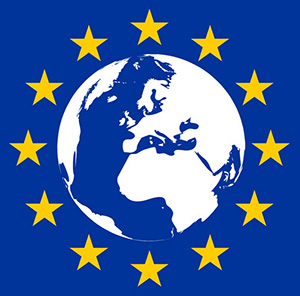
Regulating the Use of Personal Data by the European Union
The European Union General Data Protection Regulation (“EU GDPR”) is a new and more stringent regulation governing the use of personal data. This law was developed by the European Union and takes effect 25 May 2018. It applies to any organization that handles the personal information of any resident in the European Union (EU), regardless of where in the world that organization is located. GDPR requires organizations to maintain the privacy and security of any EU resident’s personal information.
This website will serve to inform the University community on how to interpret and achieve compliance under GDPR.

Frequently Asked Questions
-
What is the EU GDPR and When Does it Take Effect?
The European Union General Data Protection Regulation (“EU GDPR”) is a new and more stringent regulation governing the use of personal data. It imposes new obligations on entities that control or process personal data about people who are located in the European Union.
This regulation applies both inside the European Union (“EU”) and outside of the EU, and applies to data about anyone in the EU, regardless of whether they are a citizen or permanent resident of an EU country.The regulation takes effect on May 25, 2018.
-
Who is Covered by the EU GDPR?
The EU GDPR covers any entity that processes personal data about EU citizens or residents in connection with the offer of goods and services in the EU or the monitoring of behavior in the EU. Jurisdiction is therefore established digitally rather than physically.
We can evaluate various factors in establishing coverage, including currencies and languages used, how a website references the individual and the profiling of the individual.
-
What Countries Comprise the List of EU GDPR Member Nations?
- Austria
- Belgium
- Bulgaria
- Croatia
- Cyprus
- Czech Republic
- Denmark
- Estonia
- Finland
- Franc
- Germany
- Greece
- Hungary
- Ireland
- Italy
- Latvia
- Lithuania
- Luxembourg
- Malta
- Netherlands
- Poland
- Portugal
- Romania
- Slovakia
- Slovenia
- Spain
- Sweden
- United Kingdom
-
What Information is Subject to the EU GDPR?
The EU GDPR applies to the control or processing of ‘personal data,’ which is defined by the regulation as:
Any information relating to an identified or identifiable natural person (the data subject); an identifiable natural person is one who can be identified, directly or indirectly, in particular by reference to an identifier such as a name, an identification number, location data, an online identifier or to one or more factors specific to the physical, psychological, genetic, mental, economic, cultural or social identity of that natural person.
Examples of identifiers include (but are not limited to): name, photo, email address, identification number such as KSU ID#, KSU Account (User ID), physical address or other location data; IP address, mobile device identifiers or geo-location data about a subject. Unique biometric data, such as fingerprints and retinal scans, and genetic data are also included.
-
What are the Kennesaw State University Security Standards and Requirements for EU GDPR Data?
All personal data and sensitive personal data collected or processed by any Kennesaw State University Unit under the scope of the EU General Data Protection Regulation Compliance Policy must comply with the security safeguards and process requirements defined therein. -
Does Kennesaw State University Have a Policy Concerning EU GDPR data?
Yes.
The Kennesaw State University EU General Data Protection Regulation Compliance Policy can be found in the university Policy Portal.
-
If I Have Questions About My Personal Data That is Subject to the EU GDPR, Who Should I Talk to?
Individuals with questions about their personal data collected and processed by Kennesaw State University that is subject to the EU GDPR should contact the Office of Legal Affairs at asklegal@kennesaw.edu. -
Does the University Require my Consent Before Collecting and Processing my Sensitive Personal Data?
Individuals will be asked to sign a consent form by the department collecting their personal data. The form will be clear and easily understandable. Your consent must be freely given and is revocable at any time without detriment to you. If you should have any question about the form you should contact the Office of Legal Affairs. -
Where do I Find a Model Consent Form for the Collection and Processing of Sensitive Personal Data?
GDPR-EU Model Consent Form -
Does the EU GDPR Apply to Kennesaw State University's Cooperative Organizations?
Yes.
If the Cooperative Organization process personal data of persons located in the EU, then the EU GDPR applies to those collection and processing activities. The Cooperative Organizations should follow their respective compliance policies in regard to this data.
-
If I am Conducting Research Within the EU, What Special Precautions Should I Take?
- If you are planning a research project in any country in the EU the study must first be approved by the KSU IRB (research.kennesaw.edu/irb).
- Human subject research in the EU will now require two forms of consent, the KSU consent form and the GDPR consent form.
- The researcher is responsible for obtaining the required signatures and for the retention of both the IRB and EU consent forms. In addition, when conducting research abroad, the researcher must obtain permission to collect data from someone in a position of authority who can provide a letter to the IRB indicating that local permission has been granted (e.g., the mayor, police chief, town official, etc).













